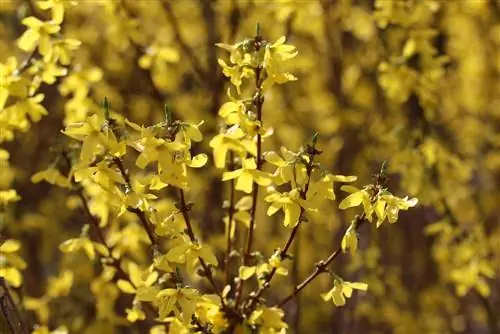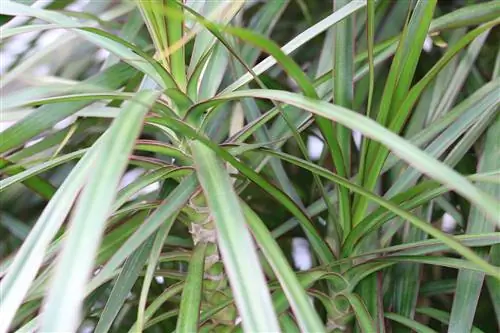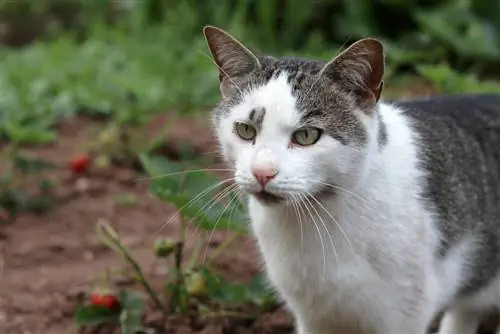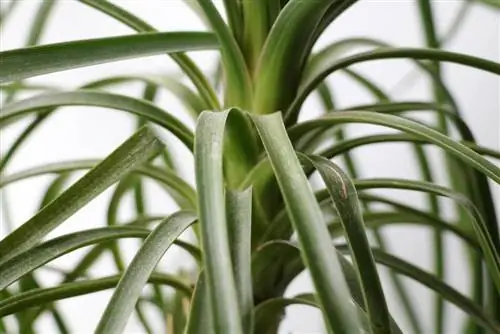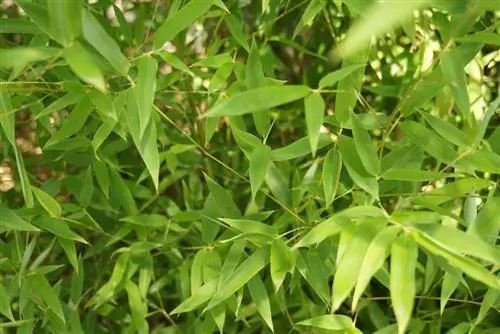- Author admin caroline@plants-knowledge.com.
- Public 2023-12-17 03:39.
- Last modified 2025-01-24 12:45.
Forsythia is a popular flowering shrub for home gardens due to the extraordinary luminosity of its yellow flowers. The plant is also called goldbell and comes from China. However, this is slightly poisonous, but is planted in many gardens out of ignorance. Symptoms of poisoning can occur in both people and animals after consumption or contact with plant parts. Therefore, small children and young animals must be supervised when playing in the garden.
Toxins contained
The beautiful, golden yellow flowers of the forsythia invite you to sniff and touch them, but all parts of the plant contain toxins. For this reason, every handling should be treated with caution. Animals usually stay away from the plant on their own and avoid contact. Children should be warned that forsythia is poisonous and therefore no part of the plant should be put in their mouths.
- Forsythia is slightly toxic
- Fruits, leaves and seeds contain saponins and glycosides
- Flowers contain glycosides and essential oils
Poisoning symptoms
Saponins are nitrogen-containing steroids that are also found in small amounts in some vegetable plants, including peas, spinach and tomatoes. For some animal species, these ingredients are completely incompatible. Saponins must not enter the bloodstream directly, as even small amounts of them have blood-dissolving properties and destroy red blood cells. If some of the forsythia plant parts accidentally enter the human system, it is not really dangerous. Large quantities of the plant have to be consumed to become seriously ill.
- Consequences of consumption include malaise and nausea
- Discomfort and pain in the stomach and intestines are also common
- In cases of hardship, diarrhea occurs
First aid measures
After touching the forsythia, it is recommended to wash your hands immediately afterwards. If parts of the plant have been consumed, mild poisoning usually occurs. However, larger quantities of forsythia must be consumed for the components it contains to have a seriously toxic effect on the human organism. This poisoning can be remedied by increasing the intake of fluids, in this way the concentration of the ingredients in the body is diluted.
- Drink plenty of water, juice or herbal tea after consumption
- Wash affected areas of the body with soap and water
Tip:
If symptoms and symptoms of poisoning persist for a long time, a doctor should be consulted promptly, as this is probably a case of severe intolerance to the toxins.
Be careful when caring for it
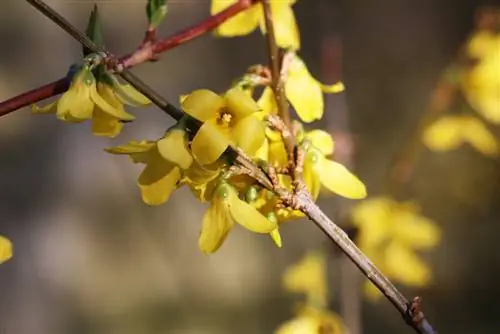
Since forsythia is slightly toxic in all its parts, skin contact should be avoided at all costs when pruning. The poison it contains appears primarily on the freshly cut surfaces. Smeared residues of the plant sap quickly lead to superficial irritation on the skin. In addition, neither children nor pets are allowed to reach these plant parts and accidentally poison themselves.
- Wearing gloves when cutting is recommended
- Do not touch your face with your hands while gardening
- Afterwards, thoroughly clean all cutting tools
- Use high-percentage alcohol to clean and disinfect
- Dispose of cut plant parts safely
- Do not put in the compost heap
Toxicity to animals
Forsythia is also only slightly toxic to dogs, cats and most other pets. However, puppies and kittens in particular like to nibble on garden plants and then poison themselves. The native insects and birds stay completely away from the forsythia, so this flowering shrub is not useful for the ecological composition of the garden or for nature conservation.
- Do not let young pets play in the garden unattended
- Avoid planting forsythia in households with pets
Conclusion
Although forsythia is only slightly poisonous, symptoms of poisoning can still occur if it comes into contact or is consumed. These can usually be remedied by increasing fluid intake; in serious emergencies, a doctor should be consulted. Gloves must be worn during care work and skin contact must be avoided at all costs. If you are planning your garden as a family with small children and also have young pets, you should avoid planting forsythia completely. Out of curiosity, they like to put everything in their mouth and nibble on it, which means that the toxins get into the body. At least until the children are older and the animals are fully grown. If forsythia is already growing in the garden, children should always be warned to be careful when handling the flowering shrub.

